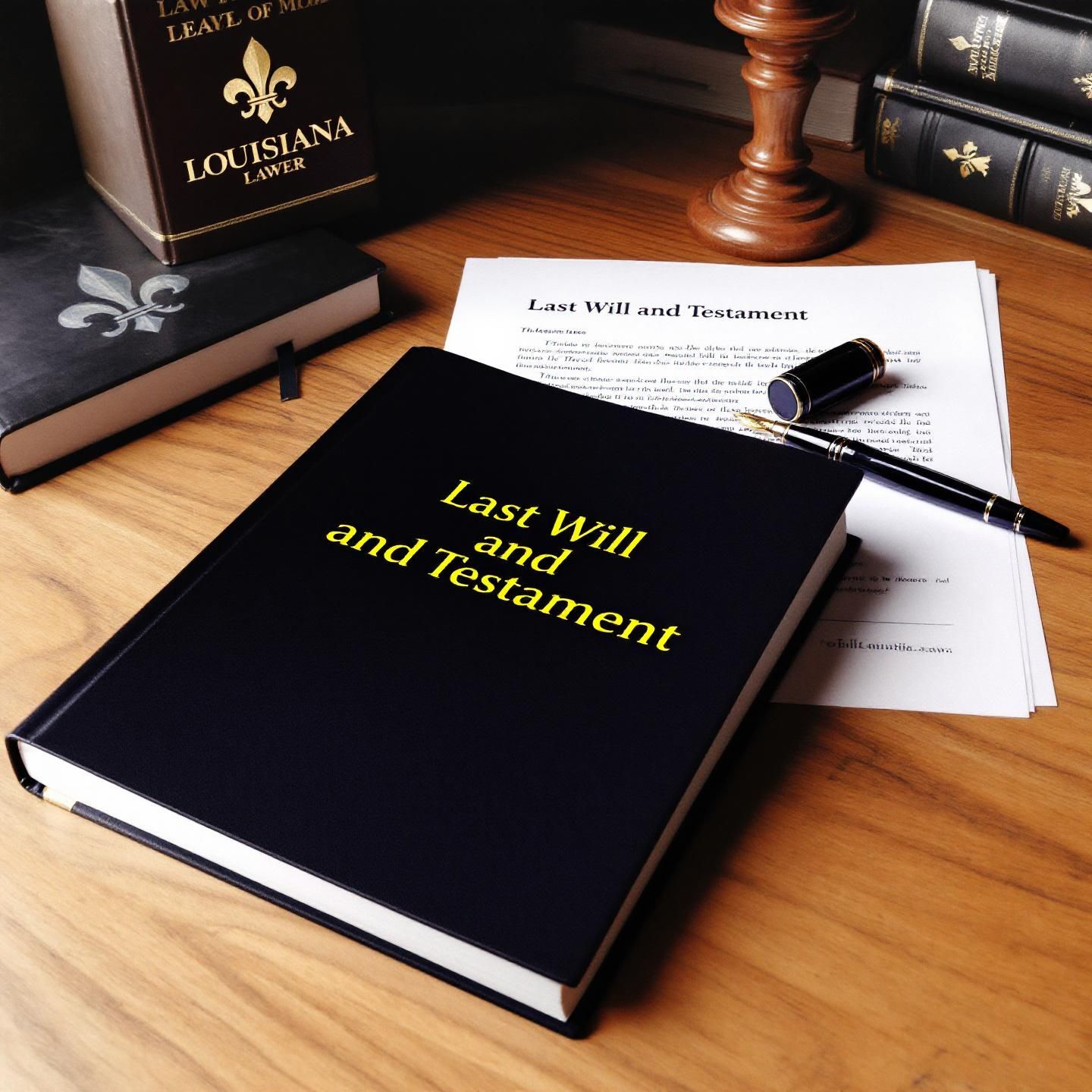What Makes a Will Valid in Louisiana? Your Guide to Legal Testaments

Do I need a lawyer to make a valid will in Louisiana?
Writing a will may not be at the top of your to-do list, but it’s one of the most important things you’ll ever do for your family. In Louisiana, the unique civil law tradition means that creating a valid will, or testament, requires strict adherence to specific legal rules. A single mistake can completely invalidate your wishes, causing stress and complications for your loved ones.
Whether you’re in New Orleans, Metairie, or St. Tammany Parish, understanding the legal requirements for a valid will is crucial to ensure your assets are distributed exactly as you intend.
Louisiana’s Two Valid Will Types: Olographic vs. Notarial
Louisiana law recognizes only two types of legal wills. Unlike in many other states, a simple typed document isn’t enough.
1. Olographic Will (Handwritten Will) ✍️
An olographic will is a will that’s entirely handwritten by the person making the will, known as the testator. This type of will is unique because it does not require witnesses or a notary. However, it must meet three strict criteria to be considered valid:
- Completely Handwritten: Every word must be in the testator’s own handwriting. Any typed or pre-printed sections can invalidate the entire document.
- Dated: It must include a clear date, such as a full date (e.g., “August 14, 2025”) or one that clearly identifies the day, month, and year.
- Signed: The will must be signed by the testator at the end.
While easy to create, olographic wills are risky. They are often challenged in court due to unclear handwriting, vague language, or missing information. For peace of mind, a notarial will is almost always a better choice.
2. Notarial Will (Formal Will) 🏛️
The notarial will is the most common and secure type of will in Louisiana. It is a formal, written document that requires the presence of a notary public and two competent witnesses.
The process for a valid notarial will is very specific:
- The will is written (typically typed or printed) and signed by the testator.
- The testator, notary, and two witnesses must all be present at the same time.
- The will is either read aloud, or the testator acknowledges to the notary and witnesses that the document is their will.
- All parties—the testator, the two witnesses, and the notary—must sign the document in the correct legal order.
Notarial wills are much more difficult to challenge in court and are highly recommended for anyone with a larger estate, complex family situations, or those who want to ensure their wishes are protected.
Bloom Legal Network can help you get connected with a Louisiana estate planning attorney who knows how to structure your will correctly — the first time.
Common Reasons a Louisiana Will is Invalid
Even a small error can render a will completely invalid in Louisiana. Here are some of the most common pitfalls:
- Improper Witnessing: Using the wrong number of witnesses (e.g., only one), having a witness who is also a beneficiary, or failing to follow the precise signing sequence.
- Formal Flaws: An unsigned or undated olographic will, or a notarial will that doesn’t follow the structured notarial process.
- Using Non-Compliant Templates: Using generic, online templates that don’t comply with Louisiana’s unique civil code, which is different from almost every other state.
- Lack of Intent: The document doesn’t clearly show the testator’s intent to distribute their property after death.
And don’t forget! A will that is valid in a neighboring state like Texas or Mississippi could be immediately rejected by a court in Jefferson Parish or anywhere else in Louisiana.
Do I Need a Lawyer to Make a Will in Louisiana?
Technically, no, you don’t need a lawyer to write a will. You can write your own olographic will or use a template. However, the real question is: what makes a will valid Louisiana — and should you?
If your goal is to protect your family, minimize legal costs and delays, and ensure your final wishes are honored, consulting an estate planning attorney is a wise investment.
An attorney who specializes in Louisiana law can help you:
- Draft a customized notarial will that is legally sound and difficult to challenge.
- Advise on forced heirship laws, which are unique to Louisiana and may require a portion of your estate to go to certain children.
- Structure your estate to minimize succession delays and avoid unnecessary taxes.
- Protect your family by clarifying how property will be transferred.
Bloom Legal Network is here to help you get it right. We’ll connect you with a trusted Louisiana succession and donation attorney who understands how to protect your wishes and your family.
Will a Will Avoid Succession in Louisiana?
No. Even with a valid will, your estate must still go through succession, which is Louisiana’s version of probate. A valid will doesn’t eliminate this legal process, but it makes it much faster, smoother, and less expensive.
Without a will, your property is distributed according to Louisiana’s intestate laws. This can lead to your assets being divided in ways you never intended and often results in family conflict.
If you want to create a will that stands up in court and supports your family across parishes — whether in New Orleans, Jefferson Parish, or beyond — reach out to Bloom Legal Network. We’ll help you connect with an attorney who can secure your legacy.
What Happens if I Die Without a Will in Louisiana?
Dying without a will is known as dying intestate. In this case, Louisiana law has a strict formula for how your assets will be distributed. Your wishes, or those of your family, don’t matter—the law decides.
For example, if you are married with children, your spouse may only receive a usufruct (a temporary right to use property), while your children get naked ownership of your share. If you have no children, your parents or siblings may inherit your estate.
Unmarried partners and stepchildren are not automatically included in this legal formula.
Protect Your Legacy: Connect With a Louisiana Attorney!
Don’t leave your family’s future to chance. A valid will is the only way to ensure your assets are distributed according to your wishes and that your loved ones are protected.
📞 Have questions about making a valid will in Louisiana? Call Bloom Legal Network at 504-599-9997 or email info@bloomlegal.com.
We’ll connect you with a skilled estate planning attorney who will help protect your wishes from day one.
Frequently Asked Questions
Louisiana is one of the only states that still has forced heirship laws. This means that if you have a child under 24 or a child with a permanent disability, you may be legally required to leave a portion of your estate to them — regardless of your wishes. If you try to disinherit them without meeting specific legal exceptions, your will could be partially invalidated. A Louisiana attorney can help you draft a valid will that respects forced heirship while still honoring your broader estate goals.
Yes, but only if it meets the legal definition of an olographic will. That means it must be entirely written, dated, and signed by hand — no typing allowed. However, handwritten wills are easier to challenge in court due to issues like unclear language or missing elements. Courts in places like St. Tammany Parish or Metairie will strictly enforce the legal requirements. For greater peace of mind and fewer disputes, a properly executed notarial will is often the better route.
Even with a valid will, your estate may still need to go through succession (probate) to transfer your assets legally. However, a will helps ensure your wishes are followed and reduces delays or conflicts. Your named executor will work with a lawyer to guide your estate through court — ideally with less friction than if you had no will at all. Having a well-drafted will prepared by an attorney familiar with Louisiana succession laws can make all the difference in preserving your estate and easing the process for your family.






